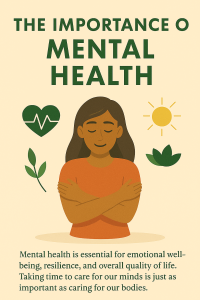
Understanding Mental Health: A Path to Well-being
Understanding Mental Health: A Path to Well-being
Mental health is an essential aspect of our overall well-being, influencing how we think, feel, and act. It also affects how we handle stress, relate to others, and make decisions. Just like physical health, mental health deserves attention, care, and understanding. In today’s fast-paced world, raising awareness and reducing stigma around mental health is more important than ever.
What Is Mental Health?

Mental health encompasses our emotional, psychological, and social well-being. It impacts every stage of life, from childhood through adulthood. A mentally healthy person can cope with daily stresses, maintain relationships, and lead a productive life. Mental health does not mean the absence of mental illness; rather, it reflects the presence of emotional resilience and positive functioning.
Common Mental Health Conditions
Many people experience mental health challenges at some point in life. Common conditions include:
- Depression: A mood disorder causing persistent feelings of sadness and loss of interest.
- Anxiety Disorders: Conditions such as generalized anxiety, panic attacks, and phobias.
- Bipolar Disorder: Characterized by extreme mood swings between mania and depression.
- Post-Traumatic Stress Disorder (PTSD): A condition triggered by traumatic events.
- Obsessive-Compulsive Disorder (OCD): Involves unwanted thoughts (obsessions) and repetitive behaviors (compulsions).
These conditions can vary in severity and duration. Early intervention and treatment can greatly improve outcomes.
Signs of Poor Mental Health
Recognizing the signs of declining mental health is crucial. Some warning signs include:
- Persistent sadness or hopelessness
- Withdrawal from friends and activities
- Changes in eating or sleeping habits
- Low energy or fatigue
- Difficulty concentrating
- Increased substance use
- Thoughts of self-harm or suicide
If you or someone you know is experiencing these symptoms, seeking help from a mental health professional is essential.
The Importance of Mental Health

Good mental health helps individuals:
- Build strong relationships
- Cope with the stresses of life
- Perform well at work or school
- Enjoy life and pursue goals
It also contributes to physical health, as mental and physical well-being are closely linked. Chronic stress and untreated mental health issues can lead to conditions such as heart disease, high blood pressure, and weakened immune function.
Ways to Improve Mental Health
Maintaining and improving mental health requires intentional effort. Here are some effective strategies:
- Talk About Your Feelings: Sharing thoughts with trusted friends or therapists can relieve stress.
- Stay Active: Regular physical activity releases endorphins that boost mood.
- Eat Well: A balanced diet supports brain health and emotional balance.
- Sleep Enough: Quality sleep is essential for emotional regulation and cognitive function.
- Connect With Others: Social support enhances resilience and happiness.
- Take Breaks: Rest and relaxation help reduce stress and prevent burnout.
- Seek Professional Help: Therapists, counselors, and psychiatrists can provide support and treatment.
Reducing the Stigma
One major barrier to mental health care is the stigma associated with mental illness. Misunderstanding, fear, and discrimination prevent many from seeking help. By talking openly about mental health and treating it like any other health issue, we can encourage others to get the support they need.
When to Seek Help
It’s okay not to be okay. If emotional struggles interfere with daily life, it’s time to seek help. Reaching out is a sign of strength, not weakness. Professional support can lead to recovery and a better quality of life.

Final Thoughts
Ultimately, mental health is not a luxury—it’s a necessity.
Whether you’re facing a mental health challenge or simply striving to maintain balance, it’s important to remember that prioritizing mental well-being improves all areas of life.
Moreover, building a culture that supports emotional health, promotes compassion, and empowers everyone to thrive should be a collective goal.
In doing so, we create communities that are healthier, more understanding, and resilient.
Therefore, taking steps—whether big or small—toward mental wellness makes a significant difference.
Remember, reaching out is a sign of strength, not weakness. Professional support can lead to recovery and a better quality of life for everyone.
In short, let’s value our mental health as much as our physical health, because both are deeply connected and essential for living fully.
One Reply to “Understanding Mental Health: A Path to Well-being”